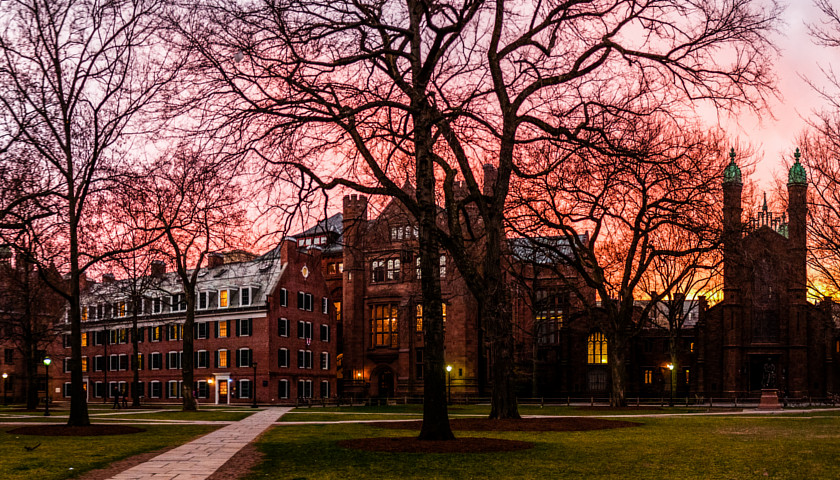by Stephen B. Presser
It was little noticed, and of little effect, but more than 2,000 professors signed a letter urging the U.S. Senate not to confirm Brett Kavanaugh to the United States Supreme Court. Given that he is the best qualified nominee in some time, having graduated from Yale and Yale Law School and having served a clerkship with Justice Anthony Kennedy and for more than a decade on the nation’s second highest court as the author of opinions embraced by the Supreme Court itself, this is curious.
This cri de coeur from the professors tells us more about them than about Kavanaugh, and it tells us about the diseased state of jurisprudence in the law schools.
The ostensible reason for the letter was Kavanaugh’s defense before the Senate Judiciary Committee against the charges brought by Christine Blasey Ford. He vehemently denied her claims that when he was a wastrel youth at Georgetown Prep, in a drunken stupor, he sought to remove her clothes, and forcibly to detain her in a bedroom with an equally inebriated comrade. There was no substantiation for that assertion, nor was there for any of the other slanders perpetrated as part of the Left’s effort to sink the nomination and ruin Kavanaugh’s reputation.
How then, to explain why so many of our academics purported to be among the most intelligent could be against the man? The signers of the letter, including many of our most prominent legal scholars, claimed that “Judge Brett Kavanaugh displayed a lack of judicial temperament that would be disqualifying for any court, and certainly for elevation to the highest court of this land.” Their evidence for that was Kavanaugh’s behavior at the special hearing called following Ford’s uncorroborated testimony.
Kavanaugh, of course, emphatically denied that the event Ford described ever happened, and no one came forward to rebut that denial. Accordingly, then, Kavanaugh was defending his honor before his family and the nation, and, as was the case with Clarence Thomas, following the uncorroborated allegations of Anita Hill against him, he passionately protested the “high-tech lynching” to which he was being subjected.
The law professors conceded the “question at issue was of course painful for anyone.” Nonetheless, they excoriated Kavanaugh for his “lack of commitment to judicial inquiry,” and the fact that he was “repeatedly aggressive” with his Democrat questioners.
The law professors, virtually all of whom are Democrats (the number of Republicans in the legal academy is minuscule) condemned Kavanaugh for describing the hearing as “partisan,” and “a calculated and orchestrated political hit.”
Kavanaugh was, of course, correct—but that needn’t be addressed here. What is striking is the inability of these many law professors to see Kavanaugh’s behavior as anything but the behavior of a naked partisan, when the same can be said for the law students at more than 30 law schools who staged a three-day walkout from classes, demanding that “anyone seeking to be elected to Congress in November commits to impeaching Kavanaugh to protect any semblance of rule of law and the people of our communities.”
A reader of Kavanaugh’s Circuit Court opinions would understand that Kavanaugh is very much in the mainstream of our jurisprudence, and is a thoughtful jurist committed to the rule of law, and devoted both to precedent and to the implementation of the original understanding of our Constitution. There is nothing scary about him, if one accepts these traditional postulates.
What the law professors and the protesting students have shown us, however, is that they do not. Their view of the law, as I tried to show in my recent book, Law Professors: Three Centuries of Shaping American Law, the view now dominant in the academy and increasingly in the Democratic Party and the mainstream media, is that the law ought to be a means of redressing past social grievances, and a tool for redistribution of resources and power from a white male patriarchy to women, persons of color, and others the Left singles out for special status.
So dominant was this view, and so strong was the heated rejection of those who manifested a contrary jurisprudence, that the signers of the anti-Kavanaugh letter found it inconceivable Kavanaugh could be acting in anything other than bad faith. They have, sadly, no sense of what it is like for a man of honor wrongly to be besmirched, and they simply do not understand the quality or character of a man truly committed to ideals so far from the now politically and academically correct.
It is no surprise that no more than a handful of us in the legal academy were active Trump supporters. Just as what was attractive to us in Donald Trump was his debunking of the politically correct and his advocacy of traditional American values, so his nomination of a man like Brett Kavanaugh is simply unacceptable to those who cling to what is now more easily able to be seen as a pernicious and, ultimately, undemocratic perspective.
Those who would use the courts as forces for social change—Kavanaugh’s enemies—simply do not accept the constitutional structure that gives policymaking power to the state and federal legislatures rather than to the courts.
It is long past time that we return to the Framers’ original conception: the important decisions about our future as a nation must be made by Congress, as well as by state and local governments. Donald Trump and Brett Kavanaugh have demonstrated they understand this, and they have both signaled that there is something wrong with a federal Leviathan and a federal judiciary that seek to frustrate popular sovereignty.
We are witnessing the beginning of the deconstruction of the administrative state, and the concomitant attack on the progressive ideology that dominated the government, the courts, and the academy for the last generation. Those who held power for so long are not going quietly into a gentle night, and their loud and agonized laments can be heard in the law professors’ letter. The Trumpian counter-reformation, or, if you prefer, the reversal of the Left’s apparent victory in the culture wars of the end of the 20th century, comes as a shock to these complacent academics, and, sadly, to many of their students.
We can only hope that out of that disappointment may come a realization of the greatness that really does sit at the foundation of our republic. Perhaps it is time for our legal scholars and for their students to return to contemplation of the Constitution itself, and the classic expositions of it, such as The Federalist, Tocqueville’s Democracy in America, Learned Hand’s The Bill of Rights, or Raoul Berger’s Government by Judiciary.
It would be a start, anyway.
– – –
Stephen B. Presser is a reporter for AmericanGreatness.com
Photo “Yale at Dusk” by Namkota CC4.0




